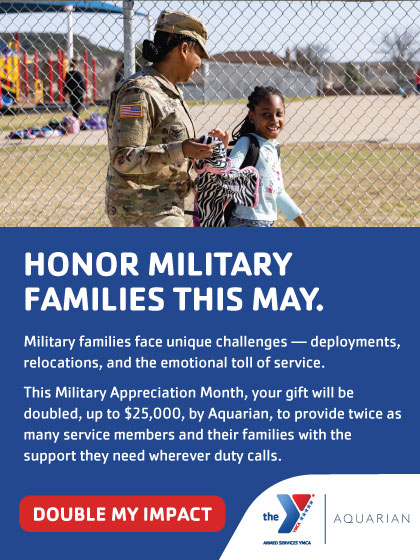Day of the Deployed: Honoring Our Heroes and Military Families
Written by Poli Dimitrova
October 26 might seem like any other day to most. But for military families, it holds deep meaning. On the Day of the Deployed, we honor all military members who have served or are currently serving in deployment for the United States of America. But this day is not just about them — it’s also about their families, who stand behind them, offering love, support, and prayers while navigating the challenges of life until they come home.
The Experience of Families Left Behind
Military spouse Nakita shared the hardships of deployment, noting that “learning to live together again after deployment” was something neither she nor her spouse had been fully prepared for. She also reflected on how difficult her husband’s deployment had been for their children. Nakita recalled a moment when her husband called while they were driving home. She put the call on speaker and spoke with him the whole way, feeling a sense of happiness. But from the backseat, her 6-year-old asked, “Why didn’t Dad want to come home?” This question brought home the emotional challenges her children had been facing.
Taking care of yourself is crucial during military deployment, as the emotional toll can be overwhelming. A military spouse emphasized the importance of self-care during deployment. As she wisely stated, “All those tasks you gave yourself while your spouse was deployed will be there tomorrow. Take care of yourself today!”
Impact on Families During Military Deployment
From emotional struggles to logistical problems, military families face a unique set of difficulties during deployment.
Higher Stress
One of the biggest hurdles for both deployed service members and their families is the increase in stress. Fear, anxiety, and worry are inevitable when faced with a new reality. For the service member, adapting to a hostile environment, working long hours, and facing physical risks can take a toll on their physical and mental health.
Meanwhile, back home, families grapple with sadness, loneliness, and the emotional strain of limited communication. Service deployment is widely considered one of the main stressors for military families.
Adjusting to Absence
When a loved one is deployed, families must quickly adjust to their absence and establish new routines, as their old daily practices are significantly disrupted. In addition to the extra responsibilities the spouse must take on, children often struggle to cope with the emotional void left by a deployed parent. A 2006 survey revealed that 20% of military families reported behavior problems in children as a response to military deployment. Additionally, 21% noted higher levels of fear and anxiety among their children. Unfortunately, this emotional toll can lead to challenges at school as well.
The anxiety and stress the spouse is already managing can become compounded by the added responsibilities and potential behavioral problems they must also navigate.
Reintegrating
While challenging, military families are highly adaptable and resilient to change — often because they have no other choice. After the first few weeks of establishing new routines and coping with the emotional rollercoaster, the family usually settles into what seems like the new normal.
However, another challenge arises when the deployed service member returns home. The family dynamic may have shifted during their absence. The spouse may have learned to juggle everything on their own, while the children might have developed particular emotions related to their parent’s absence. Reintegrating back into family life can be a real challenge, especially if the service member has experienced significant physical or mental effects.
Community Support
If you’re currently navigating deployment, remember that you’re not alone. There are many organizations and resources available to support you during this time. The Armed Services YMCA (ASYMCA), with its 12 branches and 24 affiliate partners, serves 87 military installations, offering programs designed to help military families thrive.
Operation Kid Comfort
Operation Kid Comfort was specifically created to help children experiencing loneliness and sadness due to military family deployment. Volunteers handcraft quilts, pillowcases, and lovies to comfort these children, incorporating photos and mementos of the deployed parent.
Operation Hero
While not specifically designed for children of deployed parents, Operation Hero is an excellent resource if your kids are struggling to navigate and adjust to the military lifestyle. For children in grades 2 to 5, this ASYMCA program helps them get back on track with school and improve overall behavior.
Children’s Waiting Room Program
For those of us who are the primary caregivers during a spouse’s deployment, it’s essential to remember our own health and well-being. Always having your little one with you can make it difficult to keep appointments. The Children’s Waiting Room allows you to drop off your child in the clinic’s childcare while you attend your appointment.
Keep in mind that the ASYMCA offers numerous programs and various events based on your location. Aiming to help as many military families as possible, they understand the challenges you’re facing and have the expertise to guide you through the hardships of military life. Be sure to follow your local branch on Facebook to stay updated with upcoming events and services.
Honoring the Deployed and Their Families
Today, on October 26 — the Day of the Deployed — I encourage you to take a moment to honor the military members who are currently, or have ever been, deployed in service of the United States. Their ultimate sacrifice can never be honored too much! At the same time, let’s not forget the families who stand behind them, offering unwavering support. These family members, left behind praying and waiting for their loved ones to come home, face their own hardships that often go unrecognized. They are equally deserving of our praise!



